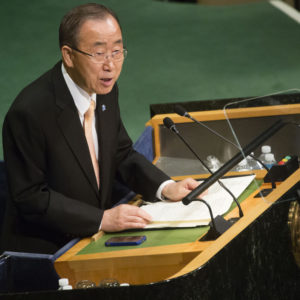SEOUL — Ban Ki-moon, now that he’s no longer U.N. secretary-general, can offer frank views that would definitely have had North Korean diplomats screaming bloody murder in the U.N. headquarters had he expressed them there.
Ban, ever bland, polite, genial, the essence of the seasoned diplomat, gave about as reasoned and practical a view of the state of talks, or non-talks, with North Korea that you’re likely to hear. It’s not likely, however, that South Korea’s President Moon Jae-in will be looking to Ban for dealing with the North, considering how far apart Ban is from Moon and his retinue.
Ban’s skills should come into play in his new position as head of a commission on fine dust, which Koreans are convinced mostly blows in from China and the Chinese say is produced by Korean factories and vehicles. Ban and Moon, however, don’t think at all alike on getting North Korea to give up its nuclear-and-missile program.
The gulf between them on North Korea was evident at a forum staged by the venerable Kwanhoon Club, an association of senior Korean journalists. While Ban was peppered with questions from reporters ranged on either side of him on stage, some of us had the chance to ask whatever we wanted on forms that were then passed up to the moderator, who relayed them to Ban.
My question, in writing, was what did Ban think of the step-by-step approach to getting North Korea to denuclearize? Also, did he think the North could be trusted to take real “steps” of its own as the U.S. took “steps.” So many people advocate this approach, most notably Moon’s senior foreign policy adviser, Moon Chung-in, who had spoken at the same forum a week or so earlier, that I had half-expected Ban to fall into line.
No way. “It is not easy to conduct salami tactics,” said Ban, talking in Korean. “That’s why we should push a Big Deal” ― a solid agreement on real denuclearization in return for an end to sanctions imposed by the United States and the United Nations after each of the North’s long-range missile and nuclear tests.
It was the big deal, offered by President Trump when he met Kim Jong-un in Hanoi at the end of last month that Kim rejected. Instead, Kim offered to shut down the North’s nuclear complex at Yongbyon, where the North’s worn-down five-megawatt reactor has produced several dozen warheads with plutonium at its core, in return for the United States giving up five sanctions ― the ones that really counted. The Yongbyon reactor, as the Americans were well aware, has not been fabricating nukes for more than a year.
Kim was not about to consider closing facilities elsewhere for making nukes with highly enriched uranium. Ban, uncharacteristically, was disparaging as he talked about the frustrations over the years of dealing with the North Koreans. Six-party talks, chaired by China, also including South and North Korea, the U.S., Japan and Russia, had proven “useless,” he said, especially since the North Koreans stopped attending them years ago.
Anyway, North Korea could simply not be trusted to live up to anything. “They explode a tunnel,” he said, “but judging from the past, how could we believe them?”
That was a reference to the explosion staged last May before the eyes of a select group of television correspondents of the site at Punggye-ri, where the North conducted its sixth, most recent, nuclear test in September 2017. The pyrotechnics made for fine TV, but no scientists were around to confirm the North had really destroyed the tunnel ― or that it had not been largely destroyed in the last nuclear test.
Ban had some words that advocates of step-by-step don’t want to hear. “If you are cheated once, you are cheated,” he said. “If you are cheated two times, you are stupid.”
Lots of stupid people are out there saying, let’s take the small deal and see what we can come up with later. Of course, these people don’t factor in where you go if North Korea does not keep its side of the bargain on even a small deal. As for how you advance from small to big, that is, to real denuclearization, they generally avoid that difficult topic.
Diplomatically, Ban did not directly criticize Moon, either Jae-in or his adviser, Chung-in, for behaving stupidly. Rather, he said, “the Korean government believes in the good heart of North Korea” but “maybe they were cheated.” Nor did he criticize those North-South summits ― all of which Jae-in’s alter ego, Chung-in, attended.
Rather, he said, “I don’t think the process has gone well.” That’s a realistic assessment that the step-by-steppers should take to heart.

